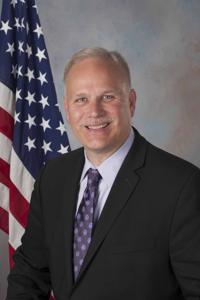The Tucson Police Department would reduce the number of sworn officers and reorganize how it operates under a plan proposed by Chief Chris Magnus.
In a memo obtained by the Star on Tuesday, Magnus said the plan is an effort to help the city save money while making the department more efficient. The plan has been presented to City Manager Michael Ortega, who asked all city departments for plans to cut costs. The city’s deficit for fiscal year 2017 is expected to be $25.6 million.
Magnus, who began as chief in mid-January, said the department would drop from about 900 sworn officers to about 830 by fiscal year 2017. That does not include “40-80 recruits in the academy or in field training at any given time,” he said in his memo. The department is authorized to have 992 sworn officers.
The attrition in sworn officers, not filling the vacancies of the authorized positions and a reduction in special assignment pay as part of the reorganization would result in a savings to the city of about $14.5 million by mid-2017, Magnus said in his memo.
Magnus said that “officer safety, community responsiveness, and overall effectiveness dictate that we continue to hire police officers” to have the department staffed at 830 sworn officers at all times.”
His memo also lists about $7 million in department needs, including new uniforms, patrol cars, cellphones and training.
Magnus could not be reached for comment Tuesday.
Sgt. Roland Gutierrez, president of the Tucson Police Officers Association, said he had not talked to members and would not be able to speak for the officers yet.
However, Gutierrez said he feels the reorganization would create an atmosphere where it will be difficult to retain officers because of its cuts in special assignments, which offer higher pay.
He also fears that bringing down the department’s sworn officers to 830 would not be safe for officers on the streets and would create an increase in response times.
Of the department’s 900 sworn officers, there are about 373 on patrol, according to department data. The police budget is $168 million. The department also has 300 civilian employees.
The proposal has some officers in special assignments returning to patrol, resulting in about $164,000 in savings, according to the chief’s memo to all Police Department personnel.
The reorganization “would have been undertaken regardless of budget concerns,” Magnus said in the memo. “With a few exceptions, the reallocation of staff does not in itself produce cost savings; rather, it allows us to continue functioning in an efficient and effective manner as we reduce our strength to 830,” he said.
Changes outlined by Magnus in the memo include:
- Moving 31 officers and four sergeants from special assignments to patrol duty. This includes moving officers and sergeants from such units as Street Crimes Interdiction, the Gang Unit, Property Crimes Surveillance and the Domestic Violence Tactical Unit.
- Having 15 detectives from burglary, auto theft and the major theft offenders unit leave police headquarters and do their work in divisions across the city.
- Keeping a deputy chief’s position vacant, saving about $225,000 in salary and benefits.
The plan also calls for the Traffic Division to be absorbed by the four patrol divisions across the city, reassigning 19 motorcycle officers and four sergeants to better meet neighborhood and commercial district traffic concerns, said Magnus.
Traffic’s DUI unit would remain intact, including the two motor officers in the nighttime DUI squad, he said. The motor squads “will work for their assigned division handling the priorities set forth by division command,” the memo states.
Although the chief said the department’s air unit would remain intact, he is working to evaluate the future of the unit, including “regionalizing” the unit and/or eliminating the department’s fixed-wing airplane and one or more of the helicopters.
Magnus also said the department would end its participation in the Commission on Accreditation of Law Enforcement Agencies. A staff position dealing with CALEA issues would be eliminated, an officer would be returned to patrol, and a sergeant would be moved to the department’s Office of Professional Standards, formerly internal affairs. That office would see an expansion under Magnus’ plans.
The department’s Public Information Office, which works with the media, would return one position to patrol and eliminate another spokesperson position. Six “redaction” specialists would be hired to help with meeting public-records requests.
Magnus also wants to increase the department’s Crime Analysis Section by increasing the staffing and hiring six additional analysts who can help provide accurate and timely crime data to officers and the community.
The memo also goes into detail about Magnus’ plans to merge Operations Division Downtown, where officers are “under-utilized” compared to other patrol divisions, with Operations Division West.
An entertainment district area will be created and patrolled by officers on bicycles and on foot. The entertainment district would be staffed by one lieutenant, four sergeants, 28 officers and one community resource officer.
The absorption of the Downtown Division into Division West would reassign personnel including 31 officers, two detectives, seven sergeants and a captain from downtown into other areas of the city. The entertainment district officers would also have other duties, including providing security for the mayor and at City Council meetings.




